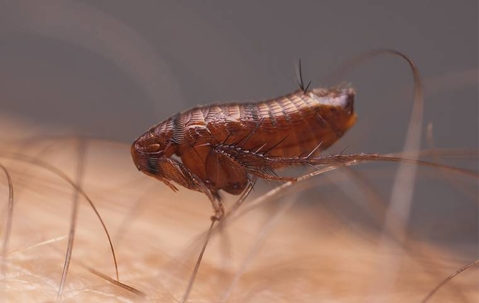Many Charlotte residents head outdoors when they need to relax or want to have some fun. Pests often rain on their parade though. Flying insects tend to persistently buzz around and may even sting. Those on the ground might bite, frighten, or ruin food. You can’t forget about the larger walking animals that could attack. All of these specimens may spread bad germs and illnesses too, like fleas. They’re among the worrisome bugs folks encounter.
Fleas communicate diseases to humans and animals. They are able to do this because they drink blood and have lots of different hosts. As if that weren’t concerning enough, these insects procreate at a fast rate. Being proactive about prevention is more than necessary. Learn what your options are, and how Go-Forth Home Services can help.
How Do Fleas Look & Behave? What Are the Dangers?
There are 2,500 species of fleas in the world, but those that plague domiciles and torture domestic animals are often called “cat fleas.” They are hard to catch for a number of reasons, one of them is their small 0.09 inch long size. These bugs have compressed reddish-brown bodies that have a sheen. While they’re known for gliding in the air, they don’t have wings. It’s their jumping legs that give them a lift across wide spaces. This is how they access the coats of animals and the clothes of humans. When they get inside homes, they gravitate to fabrics, carpeting, and pet zones.
If you don’t have any domesticated creatures or they aren’t around, fleas will surround you or another pest on the property. For instance, a squirrel or rodent. Primary infestation signs are:
- Noticing that your animals are constantly scratching themselves
- Recurrently finding flea bites on your skin; they’ll be red and itchy
- Discovering peppery fecal matter on rugs and pet bedding
- Spotting eggs around floor voids, furniture, carpeting, and pets
You shouldn’t underestimate fleas because they’re commonplace. These small, but mighty insects can circulate parasitic bacterial diseases, tapeworms, and typhus. Skin inflammation and allergic reactions come with their nibbling. Secondary bacterial infections are a possibility, as scratching your bumps can cut open your skin and expose it to germs. Studies have indicated that those who live with severe flea infestations frequently have anemia. This is a result of blood being withdrawn repeatedly.
Be on alert when you’re in a grassy or wooded region with rich vegetation; these kinds of plots are hubs for fleas and so are ponds and ditches. The pests thrive with plenty of sand, moisture, and organic matter. You’ll find them where there’s shade and covering. Your lawn may not be identical to a forest or a dew pool, but it’s conditions still suit fleas. You will find them underneath shrubs, rocks, and debris. Moreover, you should check your porches and decks. Don’t think they can’t reproduce indoors, because they definitely will.
How Can Fleas Be Prevented?
Follow these tips to avoid flea festivities in your home:
- On a regular basis, mow the lawn and trim your greenery
- Remove debris from the yard
- For your property’s perimeter, lay gravel instead of soil
- Talk about year-round flea treatments with your pet’s veterinarian
- Routinely examine and groom your animal’s fur
- Wash and vacuum carpeting and rugs often
- Inspect second-hand rugs and furniture before buying them
- Call Go-Forth Home Services if you have critters that could be hosts for fleas
What Can Go-Forth Home Services Do About Fleas?
The knowledgeable technicians at Go-Forth Home Services will apply advanced treatments designed to exterminate fleas. Our affordable services include interior and exterior care, especially for the lawn. Call Go-Forth Home Services today for a free quote!

